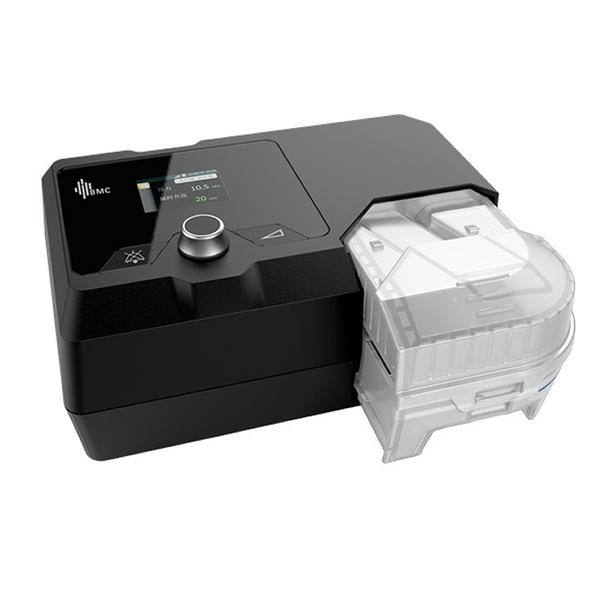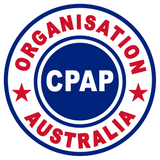What are the benefits of AutoCPAP when compared to traditional CPAP?
Predominantly there are two types of Positive Airway Pressure (PAP) machines used to treat sleep apnea, the traditional CPAP machine and AutoCPAP. CPAP is Continuous Positive Airway Pressure, and AutoCPAP, also known as APAP, is Auto-titrating Positive Airway Pressure.
A standard CPAP machine works by providing a continuous, constant flow of air to open up the airway while you sleep, and prevent collapse during obstructive sleep apnea. Our APAP machine, known as the BMC Luna IQ G2S AutoCPAP, also provides a continuous flow of air, however the pressure level changes throughout the night and responds accordingly, carrying out a breath by breath analysis. In this way, more air pressure will be provided to eliminate frequent and severe obstructions, and it will bring the pressure down again when no longer required.
In essence, the BMC Luna IQ G2S AutoCPAP changes with you, working fast to eliminate residual, or additional, sleep apnea events that may occur. A standard CPAP machine is unable to do this, and must stay at the level your CPAP Therapist or Sleep Physician sets it to, often called the optimal CPAP pressure. It is important to note that this optimal CPAP pressure will eliminate almost all of your apnea, however, this machine cannot change with you, and will not respond as your health needs change over the years. You may gain weight causing your sleep apnea to worsen, or you may lose weight and do not require such high levels of pressure. Your standard CPAP machine will not respond in these instances and pressure will not change if your airway begins to collapse and obstruct.
 Our clients love the security that the BMC Luna IQ G2S AutoCPAP can offer, knowing that as they grow older and their health needs progress, their machine will change with them, potentially reducing the number of trips to the CPAP Therapist outside their normal annual visit. The pressure on a standard CPAP machine will need to be checked more often.
Our clients love the security that the BMC Luna IQ G2S AutoCPAP can offer, knowing that as they grow older and their health needs progress, their machine will change with them, potentially reducing the number of trips to the CPAP Therapist outside their normal annual visit. The pressure on a standard CPAP machine will need to be checked more often.
AutoCPAP as a Comfort Feature
Sleep practitioners will start newly diagnosed sleep apnea patients on an AutoCPAP because it is the most comfortable, and effective way of introducing therapy. Patients often report more positive experiences when using an automatic CPAP machine, and it has been shown to increase compliance and usage time and reduce sleepiness (Ip et al). This may be due to the type of pressure delivery that patients receive with APAP, high when sleep apnea is severe, and low when not, and this can be a comfort feature. Patients report being more comfortable with lower pressures, and sleep more soundly as a result. Pressure sensitivity can lead to more frequent waking. A standard CPAP machine, on the other hand, may deliver a higher pressure all night, to eliminate apnea at all stages of the night and this may cause patient discomfort.
AutoCPAP Reduces Leak
When using conventional CPAP machines, you may experience increased mask and/or mouth leak
(Hukins), this is because the pressure needs to be that little bit higher, and stay at that level all night. Mask leak occurs when air leaks from the sides of the mask, and mouth leak occurs when the jaw falls open, or air leaks from the lips. The severity of these will vary from patient to patient, and between mask types. Air leaks are problematic because they will disturb you through the night, and may leak into your eyes, or bounce off the bedding or pillow and become irritating. Often sleep will become fragmented as a result, and thus the quality of your sleep can drop.
AutoCPAP Can Reduce Bloating
Additionally, you may experience more bloating on standard CPAP machines. Increased pressure for prolonged periods may not only cause more air to be swallowed, but as mouth leak increases you may gulp and swallow even more air.
AutoCPAP has advanced over the years and has become a trusted treatment option for sleep apnea patients. If you would like to know more about our BMC Luna IQ G2S AutoCPAP, and the many benefits it can offer, please contact us.
This website contains general medical information only and does not constitute medical advice. Please consult your Sleep Physician or professional health care provider about any medical matter, and if you are suffering from any medical condition, you should seek immediate medical attention. Always follow the medical advice of your Sleep Physician or professional health care provider.
Citations
Ip, S, D'Ambrosio, C, Patel, K, Obadan, N, Kitsios, G, D, Chung, M, and Balk, E, M. ‘Auto-titrating versus fixed continuous positive airway pressure for the treatment of obstructive sleep apnea: a systematic review with meta-analyses .’ Syst Rev. 2012; 1: 20. Published online 2012 Mar 8. doi: [10.1186/2046-4053-1-20] Viewed online Nov 29, 2018. https://www.ncbi.nlm.nih.gov/pmc/articles/PMC3351715/
Hukins, C. ‘Comparative study of autotitrating and fixed-pressure CPAP in the home: a randomized, single-blind crossover trial.’ Sleep. 2004 Dec 15, vol. 27, no. 8, pp. 1512-7.

